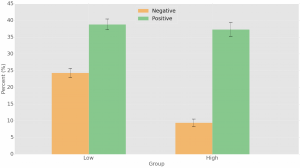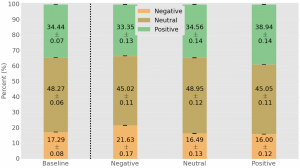E Ferrara, Z Yang. Measuring Emotional Contagion in Social Media. PLoS ONE, 2015
Useful links: Journal page
Spotlight: How Emotions Spread On Twitter from USC Viterbi on Vimeo.
Our recent work on measuring the presence of emotional contagion in Twitter is finally published on Plos One!
The paper, in collaboration with Zeyao (Patrick) Yang who recently graduated from Indiana University, is attracting a lot of media attention!
The theory of emotional contagion hypothesizes that emotions and emotional states are transferred from one person to another by social interactions. Traditional social science studies that date more than half a century ago’ (Fromm, The Art of Loving, 1956) aimed at proving that in-person exchanges cause the unconscious emotional alignment of the interacting parties. One hypothesis was that non-verbal cues (body language, facial expressions, tone of the voice, etc.) are crucial ingredients for emotional contagion.
Fast forward 60+ years, nowadays we are trying to validate the theory of emotional contagion via social media interactions! This setting is much weaker than the traditional one: first, our goal is to assess whether only textual cues are sufficient to trigger emotional contagion, through interactions where non-verbal stimuli are absent; then, we try to isolate this phenomenon in a social platform (Twitter) where links among users carry a weak meaning (users follow others mostly based on shared interests, rather than on pre-existing links in the offline world, like on Facebook). Indeed, it’s quite intuitive to expect that, if a Facebook friend informs us of a good (or bad) news, we will be happy (or sad) for her/him. However, what about complete strangers? Is language alone powerful enough to change our emotional states when exposed to emotional contents?
Our study describes phenomena compatible with emotional contagion, and proposes clever statistical techniques aimed at discounting biases common in observational social network studies.
Positive emotions are stronger than negative ones, in that they successfully affect up to four times more frequently users exposed to them than negative emotions. Furthermore, not all users are equally susceptible to emotional contagion: similarly to what happens with people’ susceptibility to catching the flu, or that of computers to catch a virus, some individuals are more inclined to change emotional states as a reaction to the contents (and the emotions) they are exposed to, while others hold stronger emotional states that rarely change, irrespectively of the type of emotional stimuli they receive.
Read the paper to learn more: Measuring Emotional Contagion in Social Media. Plos One, 2015
Media coverage
- Why you need to purge your Twitter feed of angry people – The Telegraph
- Twitter Emotions Are Contagious, Says New Study, But At Least The Positive Ones Are More So Than The Negative Ones – Bustle
- Twitter users more likely to share happiness than sadness – The Rakyat post
- Lo que encontramos en las redes sociales afecta cada vez más a nuestro estado de ánimo – Puro Marketing (in Spanish)
- La joie, plus partagée que la tristesse sur Twitter – Luxemburg Wort (in French)
- La joie, un sentiment virtuellement plus partagé que la tristesse sur Twitter – Le Soir (in French)
- Tuitea la alegría, que eso se pega – Primera Hora (in Spanish)
- Study: Twitter “infects” people with positive emotions – Gazeta.ru (in Russian)
- Cómo Facebook y Twitter pueden influir en tu estado de ánimo – La Nacion (in Spanish)
- Twitter reacts positively to upbeat emotions, study finds – USC News
- Positive emotions more contagious than negative ones on Twitter – Phys.org
- New data suggest social media brings out the best in us, after all – Quartz
- Bad news travels fast but positive posts spread wide – The Straits Times
- Positive content has greater reach – Business first magazine
- Data Shows that Positive Content Does Better on Social Media – Good

